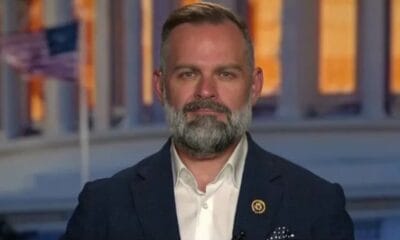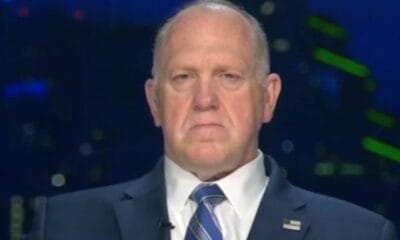Culture Wars
The Debate Over ‘Restoring America’

The following piece is part of the Washington Examiner’s “Restoring America” project. You can learn more about the project here.
“Restoring America” has become a priority for the Washington Examiner, which has launched a new product under that name. America obviously needs restoring, and you can see that simply from how divided we are. But that’s not the whole story.
Yes, we’re divided. Yes, part of the problem is that people who disagree need to learn better how to get along. Part of the problem is that opposing ideas need to coexist — that’s the American way. Yet in our political debates these days, the side that increasingly wins out is the side that rejects the very premise of coexistence with those who disagree.
Biden Botches Another One: Ukraine Desperately Wants Biden To Shut Up
Some powerful forces, largely on the Left — though not only on the Left, and certainly not the whole Left — are giddily chipping away at foundations of American life, including the possibility of civil debate. What needs restoring in America are those foundations, atop which political debate ought to happen.
And the good debates are many. Should America’s foreign policy be more aggressive or less? Is more social spending worth the cost? What should be done about inequality? How should abortion be regulated?
But all of these debates ought to happen with some agreed-upon principles. Those are the pillars of the Washington Examiner’s Restore America project, which we launched last week with a handful of important opinion pieces.
The Washington Examiner began its Restoring America project with an editorial that stated our institutional positions — that “America is going wrong” and that the ideas behind these six principles are needed to bring it back.
No Answers: Joe Biden fails to clarify Hunter’s deal$
We complemented this editorial with a series of op-eds by all sorts of voices, including lawmakers, columnists, and thought leaders. These opinion pieces played a different role in this initiative. They are meant to convey individual voices — one man or woman’s view on what is needed in the realm of justice, patriotism, community, or these other guiding lights.
- Mike Pompeo, the former secretary of state, makes the case that patriotism and unity are best served by moving power away from the federal government. He writes: “The discord that marks our discourse today is in great part a result of too much power being concentrated in our federal government. When the liberties of people and the authorities of state and local governments can all be trampled in an instant by congressional fiat, executive order, or court ruling, America has lost itself.”
- Similarly, Rep. Elise Stefanik argues that restoring community means restoring the ability of parents to make “decisions regarding the learning and development of their children.” This, she says, means reducing the federal role in education.
- Michael Barone approaches questions of equality and unity in the United States and tries to combat the forces who deride patriotism, making the case that America has always been incredibly diverse .
- Civil rights leader Robert Woodson laments that elitism has hijacked the fight for equality. He blasts racial justice crusaders who “insist on redefining the Black American struggle as a quest to trust our lives to elites who promise to make sure we all get the same amount of stuff” and argues, “What began as a grassroots movement for equality has become an elitist project, one that’s more about power than it is about real justice.”
- Abigail Shrier issues a call to battle: Conservatives need to make the gender wars a priority. “Biological sex matters because truth matters,” she writes. “Any society that abandons sex-based protections for women and girls plunges into demoralization and darkness. Young women’s bodies literally cradle our future. We cannot allow activists and their shoddy science to wreck them.”
- Sen. Tom Cotton of Arkansas argues that restoring justice in America means getting tougher on crime. He calls for broken-windows policing, or cracking down on the small crimes that are gateways to bigger crimes, and resisting the push to reduce criminal sentences.
- Matt Spalding of Hillsdale College argues for civic education oriented toward patriotism. “A healthy attachment to this country, true patriotism, is neither blind to its flaws nor fanatical in believing that America is the source of all good,” he writes. “Rather, the right sort of love of country holds it up to an objective standard of right and wrong, with the desire and intent that the country do what is right.”
Just to be clear, I’m not saying that restoring requires agreeing with all of those positions. I disagree with some of them. My own opinion piece has some differences with some of the pieces above.
Brady vs Fauci: Doctor Doom Could Learn Something From Tom Brady
But even debating, for instance, proper sentencing guidelines requires restoring the general principle that the government has a primary role of protecting the innocent from violence and has the rightful authority to punish the guilty. We need to start from a shared set of premises, even when we draw different conclusions. The problem is, we don’t seem to share those basic premises anymore.
The restoration of fundamental principles is what will allow us to restore debates, which will in turn allow us to restore America.
This op-ed originally appeared here.

 Faith3 weeks ago
Faith3 weeks agoHulk Hogan: ‘We Took America Back, One Nation Under God Again’

 Opinion4 weeks ago
Opinion4 weeks agoAlina Habba: Trump’s Team Will Deliver the Change America Voted for

 Military4 weeks ago
Military4 weeks agoRep. Mills: Hegseth Will Restore Military Focus, Address Recruitment Deficit

 Border Security3 weeks ago
Border Security3 weeks agoTom Homan: Sanctuary Cities Put Criminals First, Americans Last
















